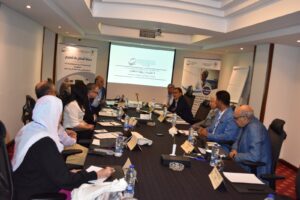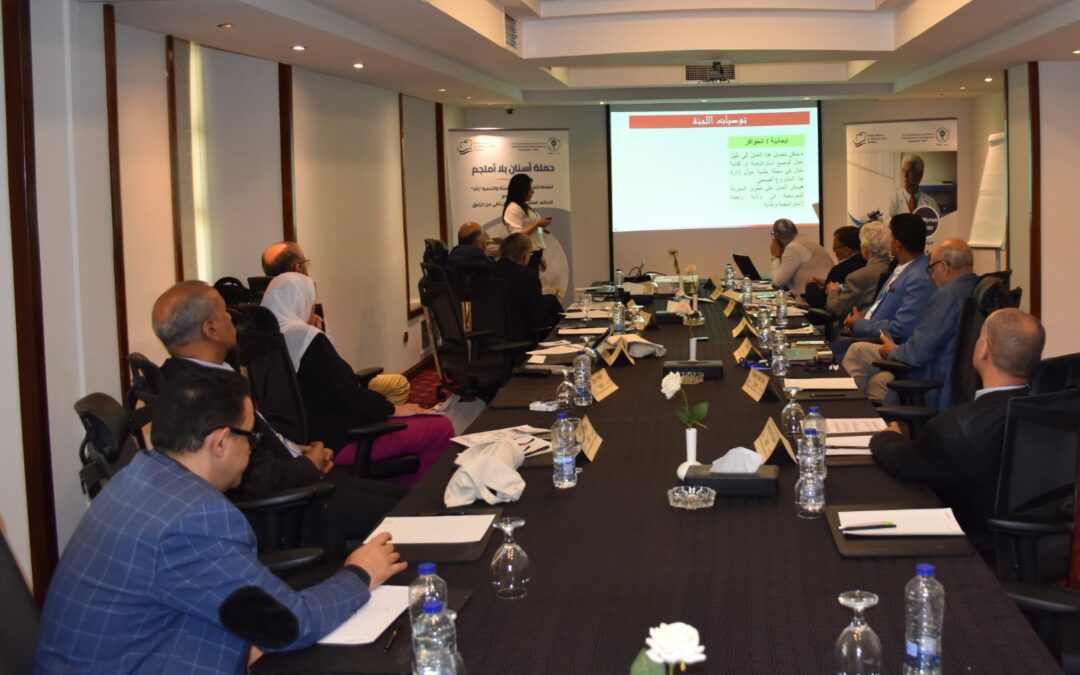شهدت العاصمة المصرية القاهرة إطلاق أول شبكة لمنظمات المجتمع المدني في الدول العربية لمنع استخدام حشوات الأسنان الزئبقية، المعروفة باسم «أملجم»، في علاج أسنان الأطفال أقل من 15 عاماً، والنساء الحوامل والمرضعات، نظراً لما تشكله تلك الحشوات، التي تحتوي على كمية كبيرة من عنصر الزئبق، من مخاطر على الصحة العامة وعلى البيئة.
جاء إطلاق هذه الشبكة في ختام أعمال ورشة العمل، التي نظمها التحالف العالمي لطب أسنان بدون زئبق، بالتنسيق مع الشبكة العربية والتنمية «رائد»، والتي استمرت على مدار يومين، بمشاركة ممثلين عن منظمات المجتمع المدني في عدد من الدول العربية، سواء من منسقي «رائد» أو غيرهم، إضافة إلى عدد من الخبراء وأطباء الأسنان من دول عربية وغيرها.
في البداية، تحدث الدكتور عماد الدين عدلي، المنسق العام لشبكة «رائد»، عن أهمية إطلاق أول شبكة من نوعها في الدول العربية للتحذير من مخاطر الزئبق، والدعوة لمنع استخدام الزئبق في علاج الأسنان، خاصة للفئات الثلاثة التي حددتها اتفاقية «ميناماتا» الدولية، التي تهدف إلى حماية صحة الإنسان والبيئة من أضرار الزئبق ومركباته وإطلاقاته بشرية المنشأ.
وأوضح «عدلي» أن حشوات «أملجم» بدأ استخدامها قبل نحو 200 سنة، وهو عبارة عن خليط يحتوي على الزئبق بنسبة 50%، بينما النصف الثاني من عناصر أخرى، ونظراً لأن التعرض للزئبق، حتى الكميات الصغيرة، قد يسبب مشاكل صحية خطيرة، فقد اعتبرته منظمة الصحة العالمية أحد أكثر 10 مواد كيميائية تؤثر على الصحة العامة الرئيسية.
ووصف شارلي براون، رئيس التحالف العالمي لطب أسنان بدون زئبق، إطلاق أول شبكة عربية لمنع استخدام الزئبق في علاج الأسنان، بأنه خطوة على الطريق الصحيح، نحو الالتزام باتفاقية «ميناماتا»، لحماية صحة الإنسان والبيئة، وكذلك للالتزام بالتعديل الأخير، الذي تم إقراره العام الماضي، بمنع استخدام حشوات «أملجم» للأطفال والنساء الحوامل والمرضعات.
كما أشار «براون» إلى أنه تم مؤخراً إنشاء المركز العربي لصحة البيئة، بالعاصمة الأردنية عمان، ضمن شبكة المراكز المرتبطة بالتحالف العالمي لطب أسنان بدون زئبق في أنحاء العالم، وأضاف أن ورشة العمل، التي استضافتها القاهرة خلال الأسبوع الأول من مايو، هي الأولى للتحالف بالمنطقة العربية، رغم أنه سبق عقد لقاءات مماثلة في عدد من الدول الأفريقية.
وأوضح المهندس زياد العلاونة، مدير المركز العربي لصحة البيئة، أنه رغم دخول اتفاقية «ميناماتا» حيز التنفيذ في 2017، إلا أنه بعد نحو 5 سنوات، وتحديداً في 25 مارس 2022، وافقت أكثر من 100 دولة على تعديل الاتفاقية، بإضافة نص يدعو إلى منع استخدام حشوات «أملجم»، في علاج أسنان الأطفال والحوامل والمرضعات، ومن المقرر أن يبدأ تطبيق هذا التعديل اعتباراً من 28 سبتمبر 2023.
ضمت قائمة المنظمات المشاركة في إطلاق الشبكة العربية لمنع استخدام الزئبق في علاج الأسنان، كلاً من الشبكة العربية للبيئة والتنمية «رائد»، ومنظمة الأرض والإنسان لدعم التنمية في المملكة الأردنية، وجمعية النادي المغربي للبيئة والتنمية، ومؤسسة إبداع للبيئة والتنمية المستدامة من اليمن، ومركز ياس للبيئة والصحة من سلطنة عُمان، وجمعية التربية البيئية للأجيال القادمة من تونس.
شارك في فعاليات ورشة العمل ممثلين عن المكتب العربي للشباب والبيئة، والمنتدى المصري للتنمية المستدامة، والمنتدى الوطني لنهر النيل، إضافة إلى مجموعة من الخبراء في المواد الكيميائية والمخلفات الخطرة، كما تم عقد جلسة عبر تقنية «زووم»، بمشاركة مسؤولين في وزارات البيئة والهيئات المعنية بعدد من الدول العربية، ومستشارين من التحالف العالمي لطب أسنان بدون زئبق

First Arab Network for Mercury-Free Dentistry Launched in Cairo
Egyptian capital, Cairo, witnessed the launch of the first network of civil society organizations in the Arab countries to prevent the use of mercury dental fillings, known as “amalgam”, in treating the teeth of children under 15 years of age, and pregnant and lactating women, due to what these fillings contain, which contain a large amount of Mercury, a risk to public health and the environment.
The launch of this network came at the end of the workshop, which was organized by the World Alliance for Mercury-Free Dentistry, in coordination with the Arab Network for Environment and Development “RAED”, and lasted for two days, with the participation of representatives of civil society organizations from Arab countries, both coordinators of « RAED” or others, in addition to a number of experts and dentists from Arab countries and others.
At the outset, Dr. Emad El-Din Adly, General Coordinator of “RAED”, spoke about the importance of launching the first network of its kind in the Arab countries to warn of the dangers of mercury, and to call for preventing the use of mercury in dental treatment, especially for the three categories identified by the international agreement, to protect human health and the environment from the harm of mercury and its compounds and releases of human origin.
Adly explained that amalgam fillings began to be used about 200 years ago, and it is a mixture that contains 50% mercury, while the second half is made up of other elements, and since exposure to mercury, even small amounts, may cause serious health problems, It has been named by the World Health Organization as one of the 10 major public health chemicals.
Charlie Brown, President of the World Alliance for Mercury-Free Dentistry, described the launch of the first Arab network for Mercury-Free Dentistry as a step on the right path towards adherence to the Minamata Convention to protect human health and the environment, as well as to adhere to the latest amendment, which was approved in 2018, it prohibited the use of amalgam fillings for children and pregnant and lactating women.
Brown also indicated that the Arab Center for Environmental Health was recently established in Amman, Jordan, within the network of centers associated with the World Alliance for Mercury-Free Dentistry around the world, and added that the workshop, which was hosted by Cairo during the first week of May, is the first for the alliance in the Arab region, although similar meetings have already been held in African countries.
Engineer Ziyad Al-Alawneh, Director of the Arab Center for Environmental Health, explained that although the Minamata Agreement entered into force in 2017, after about 5 years, specifically on March 25, 2022, more than 100 countries agreed to amend the agreement, by adding a text calling for preventing The use of “Amalgam” fillings in the treatment of children’s teeth, pregnant and lactating women, and it is scheduled that this amendment will be implemented as of September 28, 2023.
The list of organizations participating in the launch of the Arab Network to Prevent the Use of Mercury in Dental Treatment included the Arab Network for Environment and Development “RAED”, the Land and Human Organization for Supporting Development in the Kingdom of Jordan, the Moroccan Club for Environment and Development, the Creativity Foundation for Environment and Sustainable Development from Yemen, and the Yas Center Environment and Health from the Sultanate of Oman, and the Association for Environmental Education for Future Generations from Tunisia.
Representatives of the Arab Office for Youth and Environment, the Egyptian Forum for Sustainable Development, and the National Nile River Forum participated in the activities of the workshop, in addition to a group of experts in chemicals and hazardous waste. A session was also held via “Zoom”, with the participation of officials in the ministries of environment and relevant bodies, from Arab countries, and consultants from the World Alliance for Mercury-Free Dentistry.

